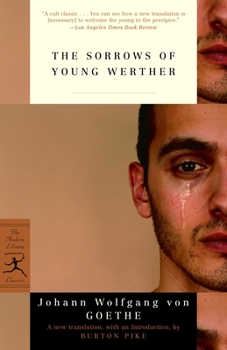The Sorrows of Young Werther
Select Format
Select Condition 
Book Overview
A major work of German romanticism in a translation that is acknowledged as the definitive English language version. The Vintage Classics edition also includes NOVELLA, Goethe's poetic vision of an idyllic pastoral society.
Format:Paperback
Language:English
ISBN:0812969901
ISBN13:9780812969900
Release Date:February 2005
Publisher:Random House Publishing Group
Length:149 Pages
Weight:0.30 lbs.
Dimensions:0.4" x 5.2" x 8.0"
Customer Reviews
4 ratings
Goethe's Masterpiece
Published by Thriftbooks.com User , 24 years ago
Although this was one of Goethe's earliest works, it is quite possibly his greatest. It allows the reader to experience the ups and downs of the irrational main character as he falls blindly and passionately in love with a married woman. Werther is the most passionate character ever created in literature, becoming possessed by nature, love, and himself. Although he sees his own destruction coming, he can and will do nothing to stop it. The first book is mostly autobiographical, based on Goethe's love for Charlotte Buff. Book two is a mor ebiographical account of one of Goethe's acquaintances. The story is truly captivating and emotionally draining. The language, in the English and even more so in the German, is powerful and fits perfectly to the overall mood of the story. There is beautiful imagery and the role of nature is carefully portrayed. This book should be read by all.
A Social Interpretation
Published by Thriftbooks.com User , 24 years ago
It may be difficult for contemporary readers to understand why, after reading "The Sufferings of Young Werther", so many young German men of Goethe's time killed themselves. Not only did they kill themselves but also they dressed in the same clothing that Werther wears when he takes his own life. Clearly they identified with Werther and it is incumbent upon us to understand why.For those of you who are not familiar with the story, Werther is a youthful German gentleman at the dawn of his civil service career. Unlike his contemporaries, Werther is awkward, socially clumsy, and extremely sensitive. He is also desperately in love with a woman named Charlotte (Lotte) whose feelings toward Werther are not mutual. After Lotte rejects him, Werther goes to a party where he is publicly humiliated. This being more than Werther can bear, he returns home and kills himself with a pistol.Werther's suicide is more than a response to Lotte's rejection. In a sense it is a disavowal of the society he lives in. Werther's emotions and sensitivity make him something of an oddball among his peers who ultimately scorn and reject him. At the end of the story, Werther is not only heart-broken but also isolated.Some reviewers have drawn interesting comparisons between Werther and other romantic heroes such as Heathcliffe. The comparison that interests me the most is the one between Werther and Pechorin, the notorious protagonist of Lermantov's "A Hero of Our Times". Unlike Werther, Pechorin is a man of action who isn't rejected by women or society but who ultimately rejects them. Pechorin does not kill himself directly, but he leads a life-style, replete with adventures and duels that ultimately results in his destruction. Both characters essentially feel that they have no place in the world they live in and each orchestrates his own destruction.In a sense, Werther and company are predecessors of existentialist anti-heroes such as Merseault, the taciturn narrator in "The Stranger". They may also be the precursors of more contemporary figures such as Jim Morrison, Janice Joplyn and Kurt Kobein. If literature reveals a trend of alienation and self-annihilation in the western world during the past two hundred years, then we ought to ask ourselves why it occurs. Perhaps as the world grows more organized, technical, and full of protocol it requires an increasingly larger degree of conformity. Cooperation and team-work demand the removal of individual impulses. If one can't love or can't act outside of public requirements then one has few alternatives left. When critics complained to Goethe about the copycat Werther suicides, he responded that if the commercial system killed so many young men, then couldn't Werther have a few. Suicide, like so many other extreme acts of destruction, isn't the solution to rejection, loss, and alienation, but it is certainly a symptom that is difficult to ignore.
Wonderful translation and a wonderful story
Published by Thriftbooks.com User , 25 years ago
I am certain that Goethe should be read in German to fully appreciate his work. Catherine Hutter to me is the best translation of 3 translations I have read. Werther is a most wonderful book full of introspection and reflections of life. Napoleon read it 40 times! and was his chosen book to take when he visited Egypt. Thomas Mann read it over 10 times and I have read it five times already. After reading Werther, the reader must read Goethe's Reflections on Werther ( in the same book) to really understand the reason why he wrote this book. This is one of my favorites. Do not forget the Divan, Faust and mostly his biography by Emil Ludwig . . . . his poetry is the best!
Applause for the greatest/most profound work of modern lit.
Published by Thriftbooks.com User , 25 years ago
Werther is *arguably* the greatest literary work of the modern world. Johann Wolfgang von Goethe--world-renowned German classicist and author of Faust, Wilhelm Meister's Apprenticeship, and many more--has created a BEAUTIFULY worded story which displays his unique views on love, death, etc. As German author Thomas Mann said, "...The nerve-shattering sensitivity of this little book [TSOYW] provoked a storm of applause which broke all bounds and fairly intoxicated the world..." Though the genius of Goethe is praised throughout the world, he is rarely taught in the United States because his work--which is, even at it's dryest, poetic--translates poorly into English. Do not miss the opportunity to read this. If I were to be locked away forever with just one book, I would choose The Sorrows of Young Werther.





